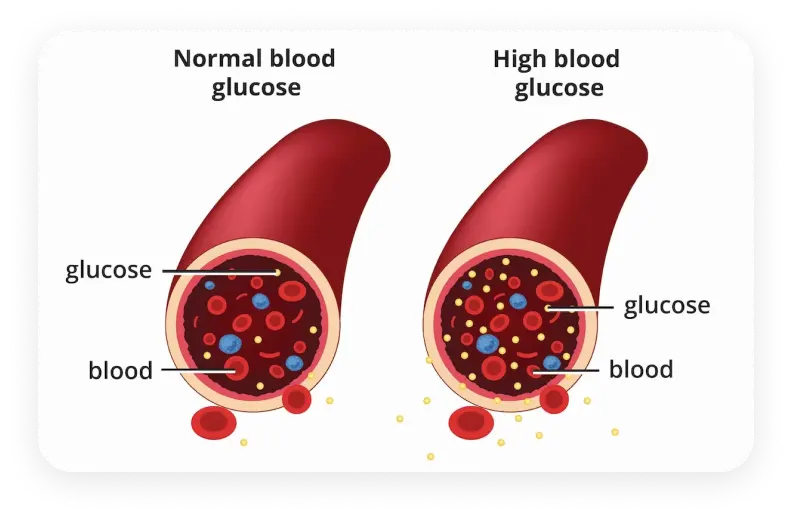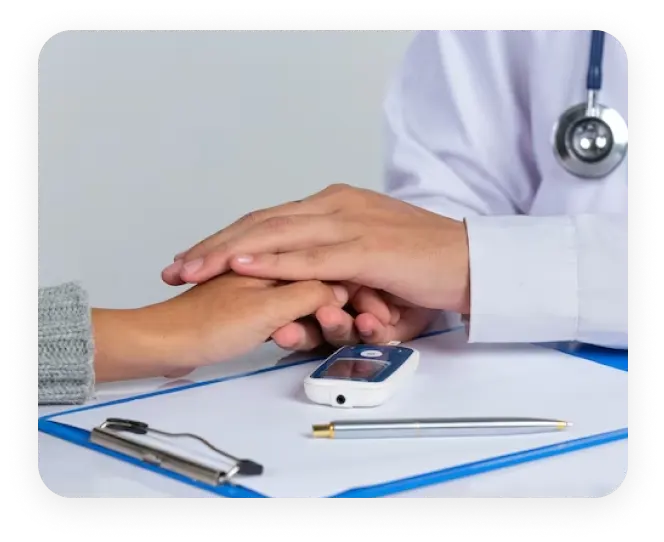Diabetes Treatment
Did you know?
Diabetes is a global epidemic, with an estimated 463 million adults living with the condition worldwide. According to research published in The Lancet, the prevalence of diabetes has more than doubled over the past four decades, making it one of the most significant public health challenges of the 21st century.
What you should know about Diabetes
Diabetes, or diabetes mellitus, is a group of metabolic diseases where a person has high blood sugar. This happens either because the pancreas doesn't make enough insulin or because the cells don't respond properly to the insulin it produces. There are three main types: type 1, type 2, and gestational.
Normally, our bodies turn sugars and carbs into glucose, which fuels our cells. But for people with diabetes, it's a bit different. Their bodies don't make enough insulin or can't use the insulin properly.
The result? Glucose piles up in the bloodstream because the cells can't take it in. High glucose levels can harm tiny blood vessels in the kidney, heart, eyes, and nerves, leading to issues like heart disease, stroke, kidney problems, blindness, and nerve damage.

The types and stages of Diabetes you should be aware of
1. Type 1 Diabetes
Type 1 diabetes, also called insulin-dependent or juvenile-onset diabetes (if it starts in childhood), happens when the body's immune system attacks its own pancreas. This can be due to genes or issues with the pancreas's beta cells.
What are beta cells?
It's like a tiny, highly efficient sugar traffic controller, working diligently to keep our blood sugar levels in check.
Medical Risks
People with type 1 diabetes have risks related to damage in blood vessels, especially in the eyes, nerves, and kidneys. There's also a higher chance of heart disease and stroke.
How to treat Type 1 Diabetes
Type 1 diabetes is managed by giving insulin. Insulin is a crucial hormone that's put under the skin using syringes, insulin pens, jet injectors, or insulin pumps. Regular insulin use is important to control blood sugar levels and avoid complications.
2. Type 2 Diabetes
Type 2 diabetes is the most common, making up about 95% of all cases. In this type, the pancreas produces minimal insulin, and either not enough or the body's cells resist it.
Medical Risks
Though milder than type 1, type 2 diabetes still brings major health risks, especially to the small blood vessels in the kidneys, nerves, and eyes. There's also an increased risk of heart disease and stroke.
How to treat Type 2 Diabetes
While there's no cure, type 2 diabetes can be managed through weight control, good nutrition, and exercise. Medications may also be used as needed to keep the condition in check. Consistent healthy habits play a crucial role in controlling and living well with type 2 diabetes.
3. Gestational Diabetes
Gestational diabetes is a type triggered by pregnancy, often diagnosed in mid to late pregnancy. Approximately 2 to 10 percent of pregnant women are affected by gestational diabetes.
Medical Risks
High blood sugar levels in a pregnant woman are passed to the baby through the placenta, causing potential complications. While gestational diabetes poses a higher risk to the baby than the mother, it can lead to issues like abnormal weight gain, breathing problems, and an increased risk of obesity and diabetes for the baby. Due to rapid fetal growth, there's also a risk of the mother needing a cesarean section.
How to treat Gestational Diabetes
For expectant mothers with gestational diabetes, management involves close collaboration with healthcare teams. Treatment includes meticulous meal planning, proper nutrition, daily exercise, and, if necessary, insulin to regulate blood sugar levels. Controlling gestational diabetes is vital for the well-being of both the mother and the baby.
Testing for Diabetes and Prediabetes: A Quick Guide
These tests help doctors diagnose and manage diabetes or prediabetes, enabling timely intervention for better health outcomes. Regular screenings are essential, especially for those at risk, to catch and address these conditions early.
Fasting Blood Sugar Test
- After an overnight fast, a blood sample is taken.
- Prediabetes: Blood sugar level of 100 to 125 mg/dL.
- Indication: Blood sugar level of 126 mg/dL or higher.
Random Blood Sugar Test
- Blood sample taken at any time, regardless of recent meals.
- Indication: Blood sugar levels of 11.1 millimoles per litre or higher.
Glycated Haemoglobin (A1C) Test
- Measures average blood sugar level over the last 2-3 months.
- Percentage of blood sugar attached to haemoglobin is assessed.
- Prediabetes: Blood sugar level of 100 to 125 mg/dL.
- Indication: Blood sugar level of 126 mg/dL or higher.
Oral Glucose Tolerance Test
- Fasting blood sugar measured after an overnight fast.
- Patient drinks a sugary liquid, and blood sugar is tested periodically over two hours.
- Prediabetes: Reading between 140 and 199 mg/dL.
- Indication: Reading of more than 200 mg/dL after two hours.
Testing for Gestational Diabetes During Pregnancy
Recommendation
If you're pregnant and not diagnosed with diabetes, it's advisable to get tested for gestational diabetes after the 24th week of pregnancy, as recommended by the U.S. Preventive Services Task Force.
Testing Methods
If you're pregnant and not diagnosed with diabetes, it's advisable to get tested for gestational diabetes after the 24th week of pregnancy, as recommended by the U.S. Preventive Services Task Force.
Random Blood Sugar Testing
A blood sample is taken at any time, regardless of meals.
Oral Glucose Tolerance Test
Involves fasting overnight, then drinking a sugary liquid, and blood sugar is periodically tested over the next two hours.
Treatment and Options in Clearwater, Seminole and Palm Harbor At All Care
As an experienced care provider we at All Care understands the complexities of Diabetes, the resources necessary to provide the best diabetes care for our patients. We help you navigate your emotional and physical journey in the most healthiest and carefree manner. We believe:
"Diabetes is not a stop sign; it's a detour toward a healthier and more conscious life journey."
Schedule an Appointment





